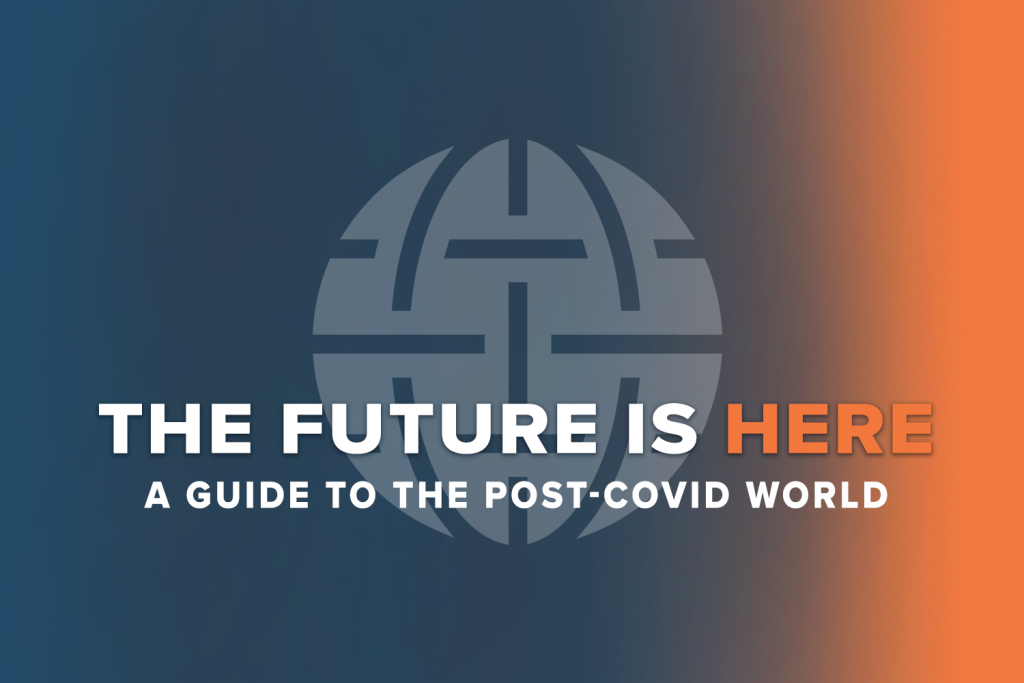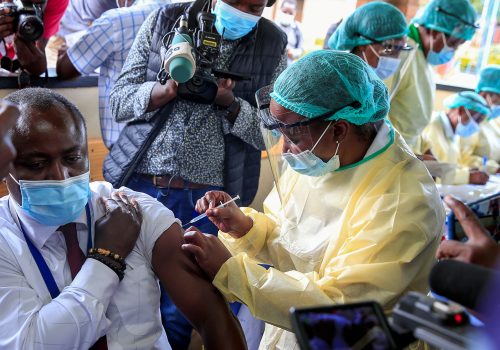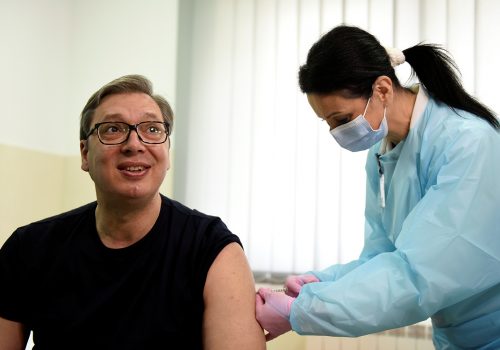The future is here: A guide to the post-COVID world 07/09/2021
Welcome to your guide to where the world is headed during the pandemic era and beyond, from Andrew Marshall. Each week, we’ll bring you the latest and most significant expert insights and international news about how coronavirus is reshaping international affairs. To stay updated each week, sign up to the newsletter here.
Let’s take a spin around the globe, in seven minutes or less.
In top stories this week:
- Some of us are on our way back to normal. The Economist has the index to prove it.
- How Delta, the COVID-19 variant on steroids, poses new challenges for the United States.
- The United Kingdom’s next move toward becoming the “most unrestricted society in Europe.”
- But first…
The big story
This week’s key theme: The pandemic-fueled rise in camping may signal a big shift in how we live.
This weekend, I am going camping. My family enjoyed the great outdoors before COVID-19, but we did it more last year—being rural, remote, and socially distanced felt great. And it did for tens of millions of others across America.
“If it seemed in 2020 like campsites were harder to find, trails were more congested, summits were more crowded and trailhead parking spots were more full—they were,” the Daily Camera of Boulder, Colorado reports.
This year, the Fourth of July weekend saw record-setting crowds at state parks and campgrounds across the state of Michigan, reports Fox 17 from Kalamazoo, adding that “This past weekend, state parks were nearly 96% occupied and lines formed at many entrances with visitors waiting to get in.” And camping, in particular, is hot.
“The trend began almost immediately after the first wave of lockdowns fell in place,” says the Observer which described how Jeff Cavins, cofounder of a shared recreational vehicle (RV) rental marketplace called Outdoorsy, thought his company “would have to give up the entire spring season of 2020 as the coronavirus ravaged the nation,” but instead saw increased demand: Booking revenue grew 4,000 percent from April to October 2020, the Observer reports.
If you have a mental image of these campers that is something like an older white man in a plaid shirt, then ditch it. “In fact, 6-in-10 first-time campers are now from non-white groups and the overall representation of campers in the US is very closely aligned to Census figures,” says The North American Camping Report from Kampgrounds of America. “The ‘average’ camper is evolving and with it, we are seeing more people from backgrounds of all types finding their own space in the great outdoors.” Nearly one-fourth of new campers are African American. Three-fourths of campers are from households with children.
And if your mental image included a small tent in the wilderness, then that’s not right either. Many of the new campers went for RVs, the large homes-on-wheels long beloved by Americans and now newly popular. “Year to date, Outdoorsy has already seen a 145 percent growth,” says the Observer. The demographic of RV campers is changing too, as Millennials and Gen X members made 80 percent of Outdoorsy’s new bookings. “The RV industry has historically been [a business for] Boomers and retirees. That has completed shifted now. It’s a young people’s game,” the Observer quoted Cavins as saying.
Many also went “glamping”—camping with a luxury element. That includes new options like fancy tents already set up with comfortable beds and furniture, but also unique options like covered wagons, tree houses, and yurts—a type of circular tent adapted from a traditional structure favored by nomadic Mongolians. “In 2021, the number of searches for unique homes on Airbnb has grown 94% compared to the same period in 2019,” says Airbnb in a survey of user habits on their site. “The number of unique listings on Airbnb, over 170,000, has grown 31% in two years.”
The new camping generation wants more than a tent and some hot dogs over the fire. Campers want WiFi, even if many of them also see it as a chance to digitally detox. And many are doing it through apps like Outdoorsy for RVs, but also Dyrt for campsites and Hipcamp for camping, treehouses, and glamping.
This outdoors surge is not without its costs. “During three weeks of road-tripping in Colorado, Utah, and Wyoming, every camping area I saw was packed—front country and backcountry alike, established and dispersed,” Krista Langlois writes in Outside Online. “I heard stories from friends who simply couldn’t find a place to camp and were forced to get a hotel room. Other people pulled over on the side of the road and slept in their cars. Still, others ignored the rules and camped where they weren’t supposed to, leaving behind fire scars, trampled vegetation, and unburied human waste. It was, quite literally, a shit show.” National Parks are struggling to deal with the crowds, and some state parks are increasing their charges.
But there is also a shift going on in how people see the outdoors, writes Good Housekeeping, quoting Jon Gray, chief executive officer of RVshare, an RV rental marketplace: “The ethos of [camping and] RV travel has moved quickly from, ‘I want to get off the grid and not be able to access the internet,’ to, ‘I want this RV to be an extension of my office, my classroom, my life.’”
Maybe it even presages a wider shift in the way we think about where we live and how we live. “As pandemic restrictions gradually lift and travel restarts, it’s looking different,” says Airbnb. “We are shifting from traveling at all the same times to all the same old places, to many of us living anywhere, at any time, for however long. This is not a temporary reaction to these many months of restrictions and isolation—it’s a step toward a world in which living and traveling are one and the same.” Maybe lines really are blurring: indoors/outdoors, home/away, working/living.
Or perhaps that’s just marketing, and we will all be back indoors later this year as the pandemic (hopefully) wanes and the weather turns cold. I shall contemplate it this weekend in my yurt in Virginia.
Subscribe to The future is here: A guide to the post-COVID world
Sign up for a weekly roundup of top expert insights and international news about how coronavirus is reshaping international affairs.

The world in brief
Insights from across the planet, in ten bullets or fewer
- The Delta variant poses an increasing threat, even in the United States. “Twenty-four states have seen an uptick of at least 10% in COVID-19 cases over the past week… as health experts and the federal government keep pressing for more people to get vaccinated,” says CNN, citing Johns Hopkins University data. Andy Slavitt, a former senior adviser to US President Joe Biden’s COVID-19 Response Team warns, “We should think about the Delta variant as the 2020 version of COVID-19 on steroids,” adding, “It’s twice as infectious. Fortunately, unlike 2020, we actually have a tool that stops the Delta variant in its tracks: It’s called vaccine.”
- So many of our audiences went virtual; the Tokyo Olympics’ will too. The games are proceeding a year behind schedule after being fraught with issues posed by the pandemic. “Olympic organizers said on Thursday that they would bar spectators from most events at the Games scheduled to open in two weeks, a decision that followed the declaration of a new state of emergency in Tokyo in response to a sudden spike in coronavirus cases,” the New York Times reports.
- On a scale from 0 to 120, the Economist’s new index tracks how “normal” we are. “Already, two things are clear: that the last phase of the pandemic will be drawn-out and painful; and that covid-19 will leave behind a different world,” the newspaper reports, noting that its normalcy index reflects both these realities. Taking the pre-pandemic average as 100, the index tracks flights, traffic, shopping, and more across fifty countries which represent 76 percent of the global population. Today, the index for the world stands at 66, which the Economist says is almost double its lowest level achieved in April 2020.
- US companies are struggling with the return to work. Nearly half of companies are bringing their workforces to a hybrid model, in comparison to the roughly one-third of companies that are adopting an “in person first” employment model, says a survey from CNBC. “Employee health & wellness (84%) and employee productivity (72%) were the most likely to be described as ‘very important’ to work plans, according to the survey. Those were followed by access to talent (58%) and aligning employees with a corporate mission (58%),” adds CNBC.
- England plans to drop COVID-19 restrictions. UK Prime Minister Boris Johnson announced that he would remove hundreds of pandemic-era regulations starting July 19, making England “the most unrestricted society in Europe,” the Guardian reports. “The so-called ‘big bang’ reopening is expected to go ahead despite warnings that daily cases in England could soar to 50,000 before masks and social distancing are ditched,” the Guardian adds.
- Globally, mental health has fared better than expected. Three psychology professors were “surprised by how well many people weathered the pandemic’s psychological challenges… People are more resilient than they themselves realize.” They wrote in the Atlantic that “Human beings possess what some researchers call a psychological immune system, a host of cognitive abilities that enable us to make the best of even the worst situation.”
The inside scoop
Insights from the Atlantic Council
Andrew Marshall is the Vice President of Communications for the Atlantic Council. He leads the Council’s media, digital, and editorial efforts, and coordinates the way the Council talks with its key communities.


